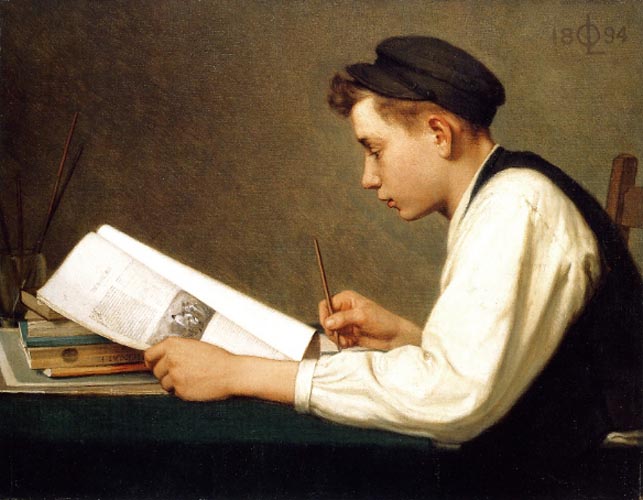By Rose Leigh and Amber Kinloch
Standardized tests, geometry worksheets, research papers—do you feel like school is just a waste of time, a bunch of arbitrary boxes you’re required to check? Or do you feel the sole purpose of it all is to get into college and then get a job?
We’ve already talked about the Catholic view of work and reasons why we perform work for God, others, and ourselves. But schoolwork presents different challenges and opportunities. Here are five deeper reasons why we work and study in school, beyond grades and college applications.
1. To Know
We do not live only for now. Rather, “God made us to show forth His goodness and share with us His everlasting happiness in Heaven” (Baltimore Catechism No. 1, Lesson 1, Q. 3). And in order “to gain the happiness of heaven we must know, love, and serve God in this world” (Ibid, Q. 4). Notice that knowing comes first. One needs to know God in order to love and serve Him.
Studying the Faith might feel boring when teachers make you memorize lots of prayers and facts: the Memorare, the seven deadly sins, the definition of a mortal sin, etc. But it’s necessary. You’ll remember those facts later when you have to make moral decisions or need a prayer in a tough situation.
2. To Understand
It’s not enough just to know facts. You must also understand what they mean. Some people know a boatload of history facts without actually understanding history. As you learn more and get older, the facts you’ve memorized will start to fit into place like puzzle pieces. Knowing what the seven deadly sins are, for instance, can help you do a quick examination of conscience and then reflect on how you can mend your relationship with God.
This isn’t limited to religious education. You can see the beauty and order of God’s Creation in science.Knowing scientific facts can also help you make prudential decisions. Similarly, learning about the successes and failures of historical figures and civilizations provides lessons and context about how to become a good citizen and a better person.
3. To Develop Our Gifts
We’re also called to learn so that we can develop our gifts and skills—not just for self-improvement, but for the sake of others as well. Think about the various inventors, scientists, and doctors who studied for many years and then used their knowledge to improve and even save others’ lives.
In the Parable of the Talents, the servants who have used and multiplied the talents from their master receive praise and are put in charge of more responsibilities, while the servant who does nothing with his talent is thrown out. Whatever your mission is, school is a time to nurture your talents and prepare for it.
4. To Explore Interests
School is also a good point in your life to start discovering what that mission might be. What are you good at, and where do your interests lie? Some people excel at science and math; others enjoy music; others aren’t ‘good at school’ but are athletic or have excellent interpersonal skills.
What you’re good at is often an indication as to what you’re meant to do, and who you’re meant to be.
5. To Develop Lifelong Habits
During your teenage years is the best time to establish lifelong habits. What helps you get your homework done on time and stay organized? Are you a visual, auditory, kinesthetic, or experiential learner? What gets you distracted, and how can you balance fun and work in a productive, healthy way? Establish habits of working and studying that are best for your unique personality, gifts, and temperament.
We’ve already discussed practicing virtue in the workplace, but you can start developing habits of virtue at school. For example, you can practice humility by accepting corrections with a good spirit, or by asking questions when you don’t understand something.
No matter what you do later in life, developing good habits will help you with your work and make it easier for others to work with you.
A Final Note
Notice that we haven’t talked about grades or how long you should be in school. Grades aren’t a measure of how well you’ll do in life; some students try very hard and earn C’s, while others cram and earn A’s. Trying your best to learn is what’s really important, not how well you do on tests.
Whether you stop at high school or go on to get a PhD is entirely dependent on your vocation and mission. While some jobs require certain degrees or special training, not everyone needs a PhD or even a college degree. It depends on what you’re called to do.
With that, don’t forget our greatest assignment—as Maria in the movie The Sound of Music says, we must “do the will of God, and to do it wholeheartedly.” If you achieve this, you will be successful, no matter your grade in math or English.

Rose Leigh
Rose has been drawing and writing since she could hold a pencil, creating worlds of giants, fairies, and adventurers from her imagination. She works as a graphic designer and loves discussing the good and creative aspects of literature, art, and film.

Amber Kinloch
Amber writes from the bunker of her living room. There she hunkers down with her laptop and a blanket while keeping an eye and ear tuned in to the activity of family life. Music set on loop keeps her energy flowing as she muses on the deeper happenings of ordinary life and what food to restock the fridge with.






0 Comments